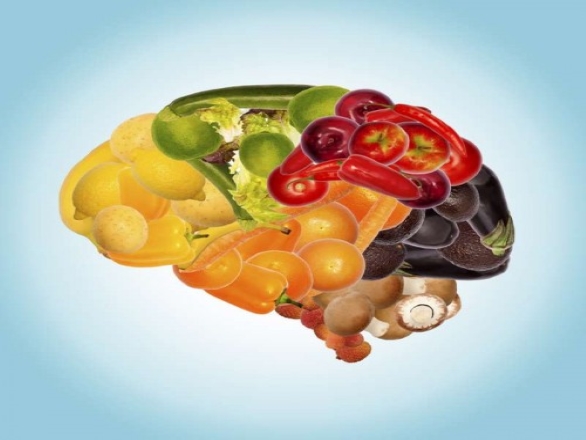In this edition
- You Are What You Eat
- Word Search
- Crossword Puzzle
- Father's Day Fun Facts
- Eggs and Spinach Scramble with Red Pepper Pesto
About the Newsletter
Monthly newsletter covering: brain health, brain activities, healthy eating; and an egg scramble excellent for your brain.
You Are What You Eat - The Role of Nutrition in Optimizing Brain Health
By: Kat Hartley and Marwan Sabbagh, MD

Fruits and vegetables formed together to shape a brain.
“You are what you eat” is a phrase many of us have heard before, and for good reason. The nutrients from the food we eat provides the fuel our body needs to function. It helps to energize us, keep our hearts pumping and our brains active. But when it comes to eating a healthy diet, many of us don’t think about the direct impact it might have on our brains.
As we grow older, our brain is exposed to more harmful stress due to lifestyle and environmental factors, resulting in a process called oxidation, which damages brain cells. Rust on the handlebars of a bike or a partially eaten apple are examples of the kind of damage oxidation can cause to your brain. Food rich in antioxidants can help fend off the harmful effects of oxidation in your brain.
In addition, new research suggests that up to 40% of Alzheimer’s cases could potentially be prevented through healthy lifestyle modifications, such as diet and exercise. With this in mind, Cleveland Clinic Lou Ruvo Center for Brain Health identified six pillars of brain health to help individuals lead a brain healthy lifestyle and reduce their risk of developing Alzheimer’s disease. One of these pillars is diet.
Research shows that a Mediterranean-style diet rich in fish, whole grains, green leafy vegetables, olives, and nuts helps maintain brain health. Implementing these modifications into your routine is easier than you might think – here are a few easy tips:
1. Load your plates with fruits and vegetables: Spinach, kale, broccoli, and other leafy green vegetables are rich in many brain-loving nutrients. Blueberries, raspberries, and blackberries are packed with antioxidants; they can potentially slow aging in the brain and elsewhere.
2. Reduce saturated fat: Try to reduce saturated fat in your diet and replace things like butter and lard with olive oil. Eating foods high in saturated fats, like red meat, butter, and dairy products, are harder for your body to break down and are associated with the development of degenerative diseases, including heart disease and Alzheimer’s disease.
3. Eat eggs in moderation: The protein and vitamins B, D and E found in eggs and egg yolks may help to improve memory. You can reap the benefits of these vitamins while keeping your cholesterol to a minimum by mixing whole eggs with egg whites to round out your omelet or scrambled eggs.
4. Incorporate fish: Fish is a great source of Omega 3, the type of fatty acid your body cannot produce, and it is good for your brain. At least twice a week, eat five ounces of Omega 3-rich fish, such as salmon, cod, haddock, tuna, or halibut.
5. Eat plenty of whole grains: Oats, barley and quinoa are rich in many of the B vitamins that work to reduce inflammation of the brain.
6. Pass up the salt and sprinkle on the spices: Many herbs and spices such as cinnamon, ginger and turmeric are packed with flavor, plus antioxidants that may help decrease inflammation in the brain and body. We know that changes in the brain associated with Alzheimer’s disease begin to develop 20 years before the onset of symptoms, so it is never too early – or too late – to start implementing a brain healthy lifestyle.
For more information on diet and the six pillars of brain health, click here.
Kat Hartley, project manager, and Marwan Sabbagh, MD, director of translational research at Cleveland Clinic Lou Ruvo Center for Brain Health presented a modified version of this article on the Today Show.
Word Search

Word search with five foods that promote brain health.
Find the foods that help our brain!
Hidden words:
- Nuts
- Fish
- Greens
- Cocoa
- Berries
Answers to the puzzle.
Crossword Puzzle

Crossword puzzle with four foods that promote brain health.
Find the foods that help our brain!
ACROSS
2. Found in chocolate and rich in antioxidants
3. Ripe in summer these fruits are sweet and colorful
4. Rich in omega-3-fatty acids
DOWN
1. Full of vitamins, examples are spinach and swiss chard
Answers to the crossword.
Father's Day Fun Facts

Happy Father's Day.
Father's Day is a time for us to celebrate the importance of fatherhood and honor the special men in our lives. There are an estimated 72 million fathers across the nation: 29 million of those fathers also being grandfathers.
Statistics provided by the U.S. census.
Eggs and Spinach Scramble with Red Pepper Pesto
Everyone, including granddad, will love this scramble! Eating eggs, in moderation, provides protein and vitamins B, D, and E which may help improve your memory. It is an “eggs-ellent” brain healthy recipe for you to try.

A dish of scrambled eggs with red bell pepper and spinach.
Makes 4 servings.
Ingredients
• 1 roasted red bell pepper (or use small jar)
• 1 clove of garlic
• 1-ounce roasted almonds (about 22 pieces)
• 2 tablespoon grated Parmesan cheese
• ¼ teaspoon salt
• ¼ teaspoon black pepper
Egg Scramble:
• 2 tablespoons olive oil
• 10 ounces baby spinach (about 16 pieces)
• 8 large eggs (6 whole eggs and 2 egg whites)
• 3 tablespoons water
• dash of turmeric, crushed red pepper - optional
Instructions:
- The pesto can be made ahead and refrigerated for 24 hours. In a blender, place the roasted red pepper, garlic, almonds, Parmesan, 1/8 teaspoon of the salt, and 1/8 teaspoon of the black pepper. Blend until smooth.
- In a medium bowl, gently whisk eggs, egg whites and water until combined.
- In a large non-stick fry pan, heat olive oil over medium heat, add spinach and sauté for about one minute.
- Add egg mixture; gently cook with spinach until eggs are just set. Remove from heat. (Eggs will continue to cook while in the pan.)
- Divide egg and spinach scramble on four plates. Top with remaining salt and pepper. Sprinkle with turmeric and crushed red peppers for added brain healthy benefits. Enjoy!

SNAP-Ed logo.
An EEO/AA institution. This material was funded, in part, by USDA's Supplemental Nutrition Assistance Program (SNAP), an equal opportunity provider.


